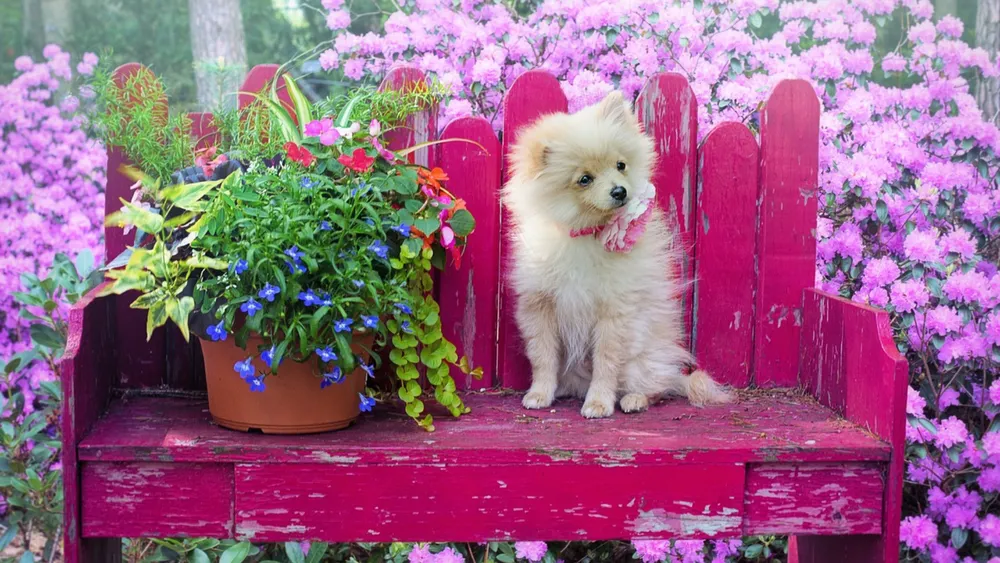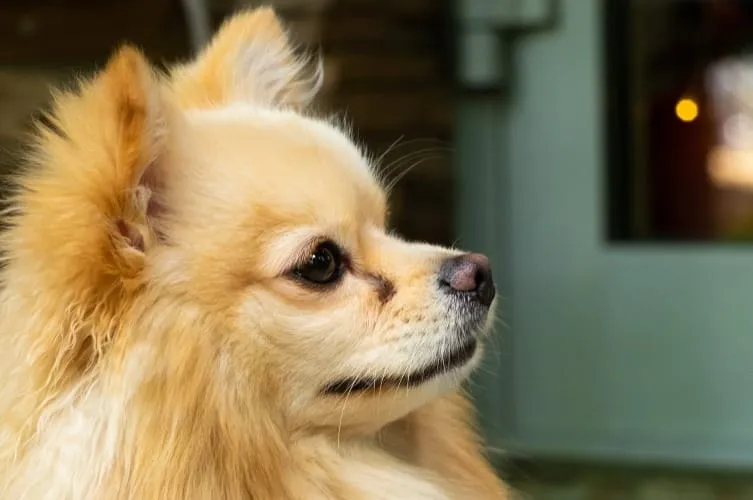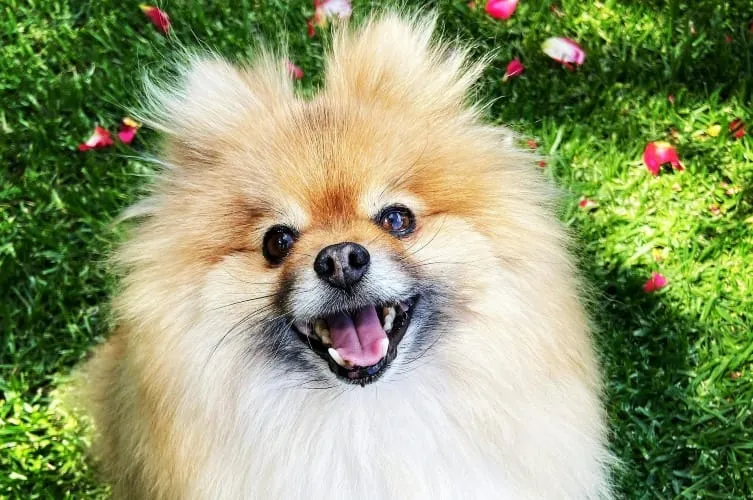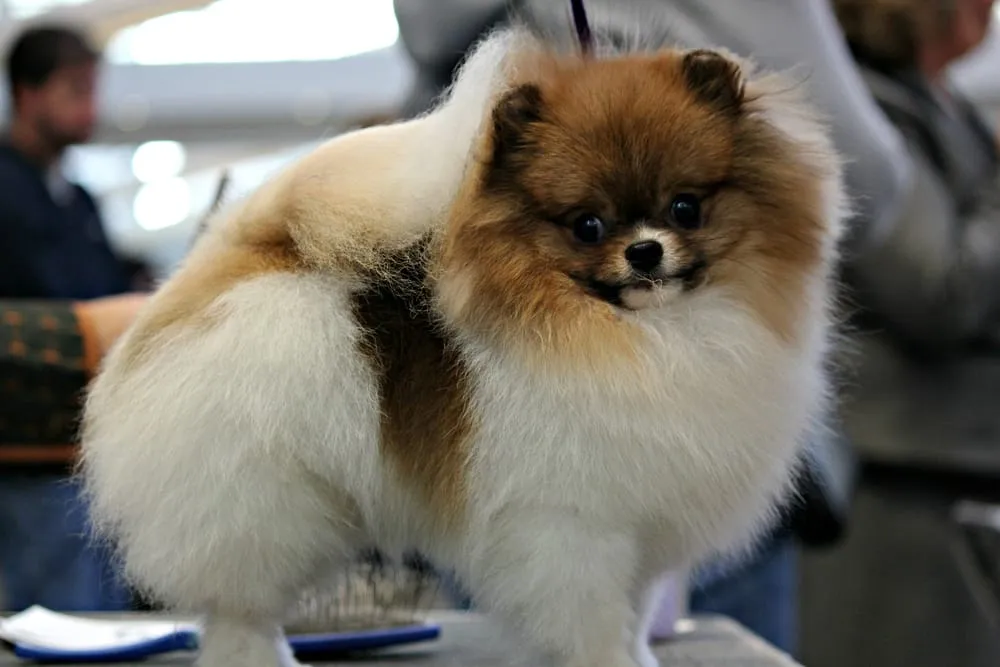Pomeranians are adorable, fluffy dogs that are popular among pet owners. However, one question that many potential owners may have is whether or not Pomeranians are easy to potty train. The answer is not a simple yes or no, as the ease of potty training a Pomeranian can depend on various factors.

Factors that can affect the ease of potty training a Pomeranian include the dog's age, temperament, and previous training. Puppies may require more patience and consistency when it comes to potty training, while older dogs may have already developed bad habits that need to be broken. Additionally, some Pomeranians may have a more stubborn or independent personality, which can make training more challenging. However, with proper training techniques and patience, Pomeranians can be successfully potty trained.
Understanding Pomeranian Behavior
Recognizing Potty Signals
Pomeranians are intelligent dogs that can be trained to do a lot of things, including potty training. However, it is important to understand their behavior and signals to effectively train them. Pomeranians have a small bladder, which means they need to go potty frequently. They may also have accidents if they are not taken out in time.
One of the first things to look out for is whining or barking. This is a clear signal that your Pomeranian needs to go outside. They may also start sniffing around, circling, or scratching at the door. These are all signs that your Pomeranian needs to go potty. It is important to pay close attention to these signals to avoid accidents in the house.
Pomeranian Personality and Training
Pomeranians are known for their lively and playful personalities. They are also intelligent and eager to please their owners. This makes them great candidates for potty training. However, it is important to be patient and consistent when training your Pomeranian.
When training your Pomeranian, it is important to use positive reinforcement. This means rewarding good behavior with treats, praise, and affection. Punishing your Pomeranian for accidents will only make them fearful and anxious. It is also important to establish a routine and take your Pomeranian out frequently, especially after meals or naps.
In conclusion, Pomeranians can be potty trained with patience, consistency, and positive reinforcement. By understanding their behavior and signals, you can effectively train your Pomeranian and avoid accidents in the house.

Essentials of Potty Training
Potty training a Pomeranian can be a challenging task, but with some patience and consistency, it can be achieved successfully. Here are some essential tips to help you with potty training your Pomeranian.
Creating a Routine
Creating a routine is crucial when it comes to potty training your Pomeranian. Pomeranians are creatures of habit, so having a consistent routine can help them learn faster. You should take your Pomeranian outside to their designated potty area at the same time every day, preferably after meals or naps.
Choosing the Right Potty Area
Choosing the right potty area is also important. Pomeranians are small dogs, so they don't need a large area to do their business. A small spot in your backyard or a designated area inside your house can work well. Make sure the area is easily accessible and that your Pomeranian knows where it is.
Using Commands and Cues
Using verbal cues and commands can also help with potty training your Pomeranian. Choose a word or phrase that you will consistently use to signal to your Pomeranian that it's time to go potty. When your Pomeranian successfully goes potty in their designated spot, be sure to give them lots of praise and treats.
Overall, potty training a Pomeranian takes time and patience. Following these essential tips can help make the process smoother and more successful. Remember to be consistent and positive, and your Pomeranian will eventually learn to go potty in their designated spot.

Positive Reinforcement Techniques
Potty training a Pomeranian can be a challenging task, but it doesn't have to be. Positive reinforcement techniques can be used to help your Pomeranian learn where to go potty. Here are some effective positive reinforcement techniques that can help you in the process.
The Power of Praise and Rewards
Pomeranians respond well to positive reinforcement, and one of the most effective ways to reinforce good behavior is through praise and rewards. Whenever your Pomeranian goes potty in the right place, be sure to praise him or her immediately. Use a happy tone of voice and give your Pomeranian a treat or reward. This will help your Pomeranian understand that going potty in the right place is a good thing.
Consistency is Key
Consistency is crucial when potty training your Pomeranian. You should establish a routine and stick to it. Take your Pomeranian outside to go potty at the same times every day, and be sure to praise and reward him or her for going potty in the right place. If your Pomeranian has an accident inside, clean it up thoroughly and do not punish him or her. Punishment can be counterproductive and can cause your Pomeranian to become anxious or fearful.
By using positive reinforcement techniques such as praise and rewards, and being consistent with your training, you can successfully potty train your Pomeranian. Remember to be patient and persistent, and your Pomeranian will learn where to go potty in no time.
Preventing and Dealing with Accidents
Potty training a Pomeranian requires patience and consistency. However, accidents are bound to happen during the process. Here are some tips on how to handle accidents calmly and maintain cleanliness and odor control.
Handling Accidents Calmly
When an accident occurs, it's important not to punish the Pomeranian. Punishment can lead to fear and anxiety, making it harder to potty train. Instead, the owner should calmly and quickly clean up the mess with paper towels and an enzymatic cleaner designed for dog urine.
The owner should also avoid using ammonia-based cleaners as they can attract the dog back to the same spot. It's important to avoid scolding or yelling at the dog as this can cause stress and confusion.
Maintaining Cleanliness and Odor Control
To prevent accidents from happening, it's important to establish a routine and stick to it. The Pomeranian should be taken out to potty frequently, especially after meals, naps, and playtime.
If accidents do occur, it's important to clean them up promptly to prevent odors from lingering. The owner should also consider using a crate or confining the Pomeranian to a specific area when they can't supervise them.
In addition, the owner should consider using potty pads or litter boxes to provide an alternative option for the Pomeranian. This can be especially helpful for owners who live in apartments or have limited outdoor space.
Overall, potty training a Pomeranian requires patience and consistency. Accidents will happen, but with the right approach, they can be minimized and eventually eliminated.

Training Tools and Aids
Potty training a Pomeranian can be a challenging task, but with the right tools and aids, it can be a lot easier. Here are some effective training tools and aids that can help you in the process:
Crate Training and Confinement
Crate training is one of the most popular methods of potty training for Pomeranians. It involves confining the dog in a crate or a playpen when not supervised to prevent accidents. Dogs instinctively avoid soiling their sleeping areas, so crate training can be an effective way to teach your Pomeranian to hold it until they are taken outside.
When selecting a crate, make sure it is large enough for your Pomeranian to stand up, turn around, and lie down comfortably. You can also place a soft blanket or a bed inside the crate to make it more comfortable for your dog.
Alternative Potty Solutions
If you prefer not to use a crate, there are other potty solutions that you can consider. Litter boxes, litter trays, and pee pads are all effective alternatives that can help your Pomeranian learn where to go potty.
Litter boxes and litter trays are typically used for cats, but they can also be used for small dogs like Pomeranians. You can use a small litter box or tray filled with cat litter or newspaper pellets and place it in an area where your Pomeranian can easily access it.
Pee pads and training pads are also popular potty solutions. These are absorbent pads that can be placed on the floor in an area where your Pomeranian is likely to go potty. They are designed to absorb urine and keep your floors clean.
In conclusion, crate training and alternative potty solutions can be effective tools for potty training your Pomeranian. It is important to be patient and consistent with your training and to use positive reinforcement to encourage good behavior. With the right tools and aids, your Pomeranian can be successfully potty trained in no time.

Pomeranian Potty Training by Age
Pomeranians are known for their intelligence and eagerness to please their owners. However, potty training a Pomeranian can be a challenging task for many pet owners. The key to successful Pomeranian potty training is consistency, patience, and positive reinforcement. In this section, we will discuss Pomeranian potty training by age.
Puppy Stage Training
Potty training a Pomeranian puppy requires a lot of patience and consistency. Puppies have a small bladder and need to go outside frequently. It is recommended to take your Pomeranian puppy outside every 1-2 hours during the day and once during the night.
When your Pomeranian puppy eliminates outside, reward them with praise and a treat. Consistency is key, so make sure to take your puppy to the same spot every time. If your Pomeranian puppy has an accident indoors, clean it up immediately and avoid scolding them. Pomeranian puppies respond better to positive reinforcement.
Adult Pomeranian Housetraining
Adult Pomeranians may already be housebroken, but it is important to reinforce good habits and prevent accidents. If you have just adopted an adult Pomeranian, it is recommended to start with basic potty training as if they were a puppy.
Establish a routine and take your Pomeranian outside frequently, especially after meals and naps. If your Pomeranian has an accident indoors, clean it up immediately and avoid scolding them.
It is important to note that adult Pomeranians may have accidents due to medical issues or anxiety. If you notice any changes in your Pomeranian's behavior or potty habits, consult with a veterinarian.
In conclusion, Pomeranian potty training requires patience, consistency, and positive reinforcement. Whether you are training a Pomeranian puppy or an adult Pomeranian, establishing a routine and providing praise and treats for good behavior can help make the housebreaking process smoother.
Creating a Supportive Environment
Pomeranians are known to be intelligent and eager to please, making them relatively easy to potty train. However, creating a supportive environment for your furry friend can make the process even smoother.
Feeding Schedules and Water Access
Establishing a consistent feeding schedule is crucial in potty training your Pomeranian. Feeding your dog at the same time every day can help regulate their digestion, making it easier to predict when they will need to go outside. Additionally, controlling your Pomeranian's water intake can help prevent accidents.
It is recommended to give your Pomeranian access to water throughout the day, but limit their intake a few hours before bedtime. This can help reduce the likelihood of accidents during the night.
Exercise and Playtime
Regular exercise and playtime can also aid in potty training your Pomeranian. Taking your dog for walks or engaging in other physical activities can help stimulate their digestive system, making it easier for them to go outside.
Providing your Pomeranian with plenty of toys and playtime can also help prevent accidents. When your dog is tired and content, they are less likely to have the urge to go potty.
In conclusion, creating a supportive environment for your Pomeranian can greatly aid in their potty training. Establishing consistent feeding schedules and controlling water intake, as well as providing regular exercise and playtime, can all contribute to a successful potty training experience.

Tips for Pomeranian Parents
Monitoring Your Pomeranian
Pomeranians are small dogs and have small bladders. Therefore, it's important to monitor your Pomeranian closely during the potty training process. Take your Pomeranian outside frequently, especially after meals, naps, and playtime. Keep a close eye on your Pomeranian's behavior, such as sniffing around or circling, as this could be a sign that they need to go potty.
It's also important to keep a consistent schedule for your Pomeranian's potty breaks. This will help them develop a routine and understand when it's time to go outside. Be patient with your Pomeranian, as accidents may happen during the training process.
Adjusting to Your Pomeranian's Needs
Every Pomeranian is different, and some may take longer to potty train than others. It's important to adjust to your Pomeranian's needs and personality. Some Pomeranians may respond well to positive reinforcement, such as treats or praise, while others may need a firmer approach.
Consistency is key when potty training your Pomeranian. Make sure everyone in the household is on the same page and using the same commands and routines. Additionally, consider crate training your Pomeranian to help with the potty training process.
In summary, potty training a Pomeranian requires patience, consistency, and monitoring. By following these tips and adjusting to your Pomeranian's needs, you can help them become a well-trained and obedient companion.
Conclusion
In conclusion, potty training a Pomeranian, while challenging, is certainly achievable with the right approach. Understanding your Pomeranian's behavior and signals is crucial to recognizing when they need to go, and creating a supportive environment can greatly facilitate the process. Consistency in routine, patience, and positive reinforcement are key elements in successful potty training. Using effective tools and aids like crate training, alternative potty solutions, and a consistent feeding schedule can also contribute significantly to your success.
Remember, each Pomeranian is unique, and their training needs may vary. Some may learn quickly, while others might require more time and patience. It's important to adjust your training methods to fit your dog's individual personality and needs. Monitoring your Pomeranian closely and responding to their cues is essential, and always approach accidents with calmness and understanding, avoiding punishment.
Ultimately, the journey of potty training your Pomeranian is not only about teaching them where to go but also about strengthening the bond between you and your pet. Through consistent, loving, and patient training, your Pomeranian can be successfully potty trained, leading to a happy and harmonious life together.




